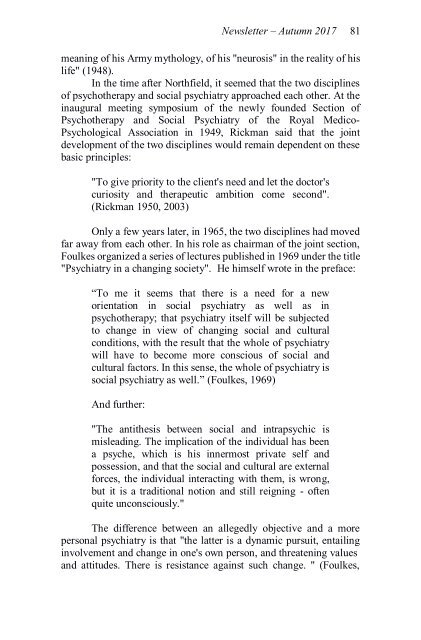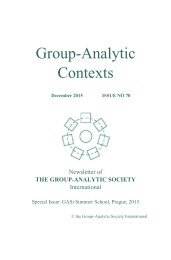Group Analytic Contexts, Issue 77, September 2017
Newsletter of the Group Analytic Society International
Newsletter of the Group Analytic Society International
Create successful ePaper yourself
Turn your PDF publications into a flip-book with our unique Google optimized e-Paper software.
Newsletter – Autumn <strong>2017</strong> 81<br />
meaning of his Army mythology, of his "neurosis" in the reality of his<br />
life" (1948).<br />
In the time after Northfield, it seemed that the two disciplines<br />
of psychotherapy and social psychiatry approached each other. At the<br />
inaugural meeting symposium of the newly founded Section of<br />
Psychotherapy and Social Psychiatry of the Royal Medico-<br />
Psychological Association in 1949, Rickman said that the joint<br />
development of the two disciplines would remain dependent on these<br />
basic principles:<br />
"To give priority to the client's need and let the doctor's<br />
curiosity and therapeutic ambition come second".<br />
(Rickman 1950, 2003)<br />
Only a few years later, in 1965, the two disciplines had moved<br />
far away from each other. In his role as chairman of the joint section,<br />
Foulkes organized a series of lectures published in 1969 under the title<br />
"Psychiatry in a changing society". He himself wrote in the preface:<br />
“To me it seems that there is a need for a new<br />
orientation in social psychiatry as well as in<br />
psychotherapy; that psychiatry itself will be subjected<br />
to change in view of changing social and cultural<br />
conditions, with the result that the whole of psychiatry<br />
will have to become more conscious of social and<br />
cultural factors. In this sense, the whole of psychiatry is<br />
social psychiatry as well.” (Foulkes, 1969)<br />
And further:<br />
"The antithesis between social and intrapsychic is<br />
misleading. The implication of the individual has been<br />
a psyche, which is his innermost private self and<br />
possession, and that the social and cultural are external<br />
forces, the individual interacting with them, is wrong,<br />
but it is a traditional notion and still reigning - often<br />
quite unconsciously."<br />
The difference between an allegedly objective and a more<br />
personal psychiatry is that "the latter is a dynamic pursuit, entailing<br />
involvement and change in one's own person, and threatening values<br />
and attitudes. There is resistance against such change. " (Foulkes,













